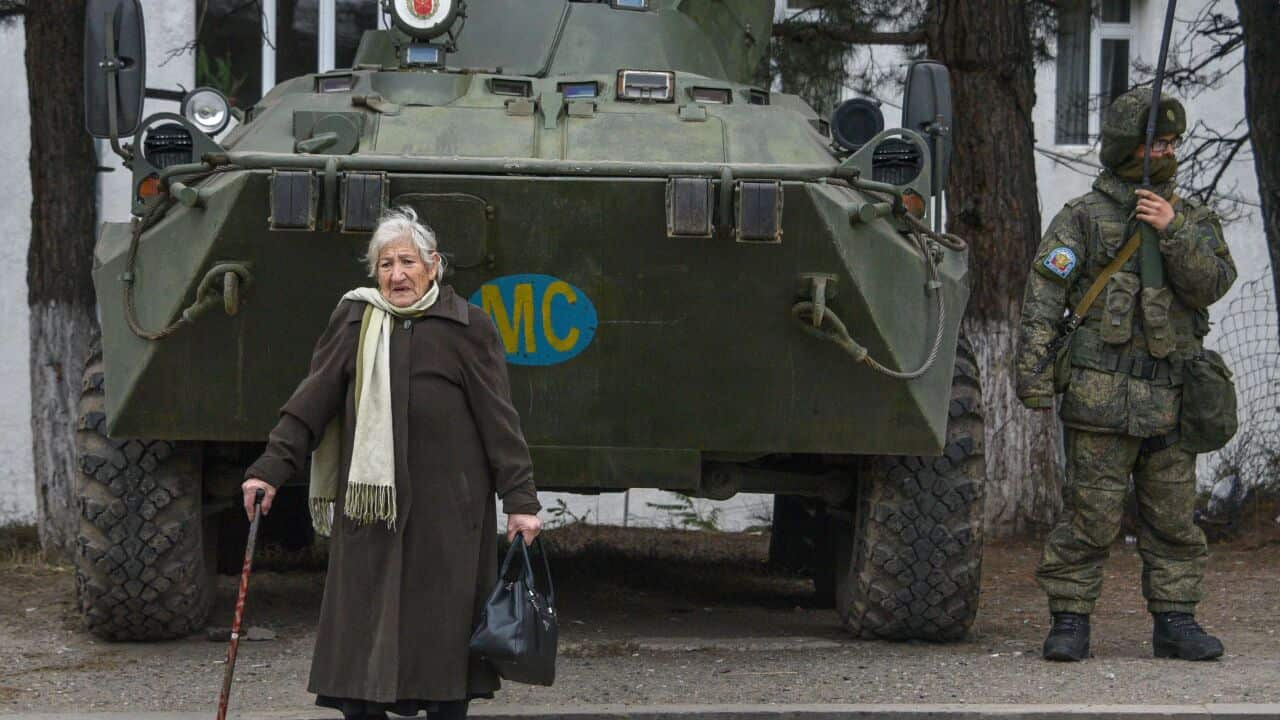Fighting , two ex-Soviet republics in the Caucasus that have gone to war twice over the disputed region of Nagorno-Karabakh.
Here are the issues surrounding one of the so-called frozen conflicts born out of the collapse of the Soviet Union.
Nagorno-Karabakh
At the heart of the standoff between Yerevan and Baku is the contested Nagorno-Karabakh region.
The Soviet authorities merged the predominantly ethnic Armenian territory with Azerbaijan in 1921.
After the 1991 collapse of the Soviet Union, Armenian separatists seized it in a move supported by the Armenian government in Yerevan.
An ensuing war left 30,000 dead and forced hundreds of thousands from their homes.
Despite a ceasefire mediated in 1994 by France, Russia and the United States, peace negotiations failed to move forward and fighting erupted frequently.
In the autumn of 2020, more than 7,500 people were killed in six weeks of fighting which ended with a Russian-brokered ceasefire that saw Armenia hand back large tracts of territory that separatists had seized from Azerbaijan in the 1990s.

Tens of thousands gathered to protest in Baku, Azerbaijan on 15 July 2020. Source: AAP
Revolts and dynasty
Armenia, a Christian country since the fourth century, has been rocked by political and economic instability since it gained independence from the former Soviet Union.
The country's post-Soviet leadership repressed opposition to its rule was accused of falsifying ballot results and was largely beholden to the interests of Russia.
In 2018, street protests brought current Prime Minister Nikol Pashinyan to power. He cracked down on corruption and introduced popular judicial reforms but faced calls for his resignation over the 2020 deal to return parts of Nagorno Karabakh, which triggered mass protests.

Volunteers of the Armenian Revolutionary Federation gather to leave for Nagorn-Karabah region in Yerevan, Armenia, 27 September 2020. Source: PHOTOLURE
Heydar Aliyev, a former officer of the Soviet security services, the KGB, ruled the country with an iron fist until October 2003. He handed over power to his son, Ilham, weeks before his death.
Like his father, Ilham has quashed all opposition to his rule but Azerbaijan's victory over Armenia in the 2020 Karabakh war boosted his popularity.

Ilham Heydar, President of Azerbaijan, speaks in a pre-recorded video message during the 75th session of the UN General Assembly, 24 September 2020. Source: UNTV
Russia and Turkey
Turkey, with ambitions to be regional powerbroker in the Caucasus, has thrown its weight behind oil-rich and Turkic-speaking Azerbaijan.
Their alliance is fuelled by a mutual mistrust of Armenia, and Ankara routinely issues strongly worded statements in support of Baku's ambitions to reclaim Nagorno Karabakh.
Yerevan harbours hostility towards Turkey over the massacres of some 1.5 million Armenians by Turkey under the Ottoman Empire during World War One.
More than 30 countries have recognised the killings as genocide, though Ankara fiercely disputes the term.
Russia, which maintains close ties with Armenia, is the major powerbroker in the region. It leads the Collective Security Treaty Organisation military alliance of ex-Soviet countries that includes Armenia.
Yerevan relies on Russian support and military guarantees because its defence budget is overshadowed by Azerbaijan's spending on arms.

A woman cries at a monument during a rally on 26 February 2019, in Baku, Azerbaijan. Source: Getty
Oil and diaspora
Baku has invested in massive sponsorship deals including with the Euro 2020 football championship, in which it hosted games.
Azerbaijan has also cashed in on an EU drive to wean itself off Russian gas following Moscow's invasion of Ukraine.
In July, Brussels signed an agreement with Baku to double its gas imports from the Caspian nation in the coming years.
On the international stage, Armenia has a vast and influential diaspora that fled during the Ottoman-era repressions.

Kim Kardashian, in the East Room of the White House, on Thursday 13 June 2019, in Washington. Source: AP
Some have appointed themselves unofficial ambassadors, like Kardashian who has been outspoken on the issue of the Armenian genocide.









